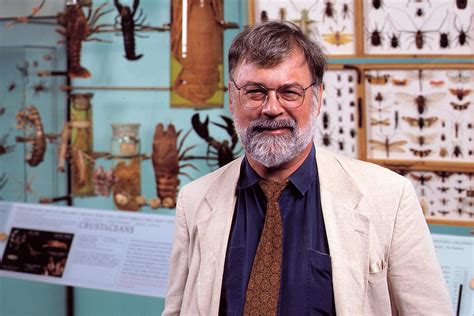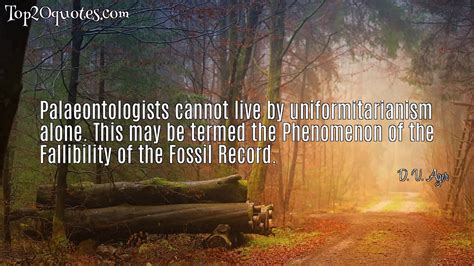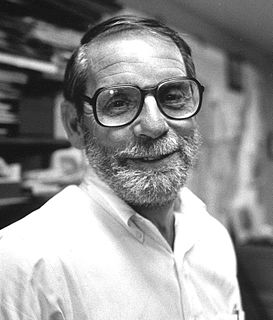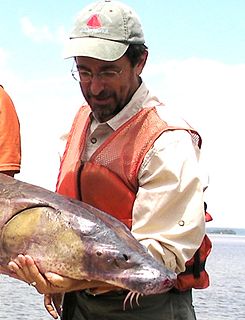Top 124 Geological Quotes & Sayings - Page 2
Explore popular Geological quotes.
Last updated on April 15, 2025.
There are a lot of Egyptians who live below the poverty line and are preoccupied with meeting basic needs. Therefore, we have to create tangible benefits from nature conservation. Only through economic incentives will we convince people to protect habitats, wildlife, geological formations, cultural heritage sites, etc. We need local communities to cooperate with us, not against us!
In science, we take large numbers of disparate facts and reduce them to see patterns. We use the patterns to reduce the amount of information. It's the reason we name species and genera and families in biology. It's also the reason we have names for certain types of geological features and so on in other fields.
In attempting to explain geological phenomena, the bias has always been on the wrong side; there has always been a disposition to reason á priori on the extraordinary violence and suddenness of changes, both in the inorganic crust of the earth, and in organic types, instead of attempting strenuously to frame theories in accordance with the ordinary operations of nature.
I have devoted my whole life to the study of Nature, and yet a single sentence may express all that I have done. I have shown that there is a correspondence between the succession of Fishes in geological times and the different stages of their growth in the egg,-this is all. It chanced to be a result that was found to apply to other groups and has led to other conclusions of a like nature.
As for climate change, it's by now widely accepted by the scientific community that we have entered a new geological era, the Anthropocene, in which the Earth's climate is being radically modified by human action, creating a very different planet, one that may not be able to sustain organized human life in anything like a form we would want to tolerate.
The quantity and quality of consciousness, one may say, have always been growing throughout geological times. In this respect man, in whom nervous organisation and therefore psychological powers have attained an undisputed maximum, may be considered, scientifically, as a natural centre of evolution of the primates.
Paleontologists ever since Darwin have been searching (largely in vain) for the sequences of insensibly graded series of fossils that would stand as examples of the sort of wholesale transformation of species that Darwin envisioned as the natural product of the evolutionary process. Few saw any reason to demur - though it is a startling fact that ...most species remain recognizably themselves, virtually unchanged throughout their occurrence in geological sediments of various ages.
In the preface to his great History of Europe, H. A. L. Fisher wrote: "Men wiser than and more learned than I have discerned in history a plot, a rhythm, a predetermined pattern. These harmonies are concealed from me. I can see only one emergency following upon another as wave follows upon wave ..." It seems to me that the same is true of the much older [geological stratigraphical] history of Europe.
Geological facts being of an historical nature, all attempts to deduce a complete knowledge of them merely from their still, subsisting consequences, to the exclusion of unexceptionable testimony, must be deemed as absurd as that of deducing the history of ancient Rome solely from the medals or other monuments of antiquity it still exhibits, or the scattered ruins of its empire, to the exclusion of a Livy, a Sallust, or a Tacitus.
The grounds on which golf is played are called links, being the barren sandy soil from which the sea has retired in recent geological times. In their natural state links are covered with long, rank bent grass and gorse. Links are too barren for cultivation: but sheep, rabbits, geese and professionals pick up a precarious livelihood on them.
We cannot see how the evidence afforded by the unquestioned progressive development of organised existence-crowned as it has been by the recent creation of the earth's greatest wonder, MAN, can be set aside, or its seemingly necessary result withheld for a moment. When Mr. Lyell finds, as a witty friend lately reported that there had been found, a silver-spoon in grauwacke, or a locomotive engine in mica-schist, then, but not sooner, shall we enrol ourselves disciples of the Cyclical Theory of Geological formations.
When geologists announced the beginning of a new geological epoch, the Anthropocene, humans destroying the environment, one of the main things they pointed to is the use of plastics in the earth. We don't think about it, but it has a tremendous effect. But these are things you don't see right in front of your eyes. You need to think about them a little, to see what the consequences are. It's easy to put them aside, and the media don't talk about them.
Considered as a mere question of physics, (and keeping all moral considerations entirely out of sight,) the appearance of man is a geological phenomenon of vast importance, indirectly modifying the whole surface of the earth, breaking in upon any supposition of zoological continuity, and utterly unaccounted for by what we have any right to call the laws of nature.
With respect to phenomena like mass extinction, somebody might say why worry about it because in a geological perspective mass extinctions aren't so bad, they wipe out some things and then 10 million years down the road we get new and interesting objects.But I tell you mass extinctions are really awful for folks caught in the midst of them.
Nationality started as something natural, but we should not be restrained by the old politics that make up these clear lines. It should have its own way of evolving. In some places, it will evolve slower and in others, faster. It's like the mountains, the ocean and the rivers. It has its own geological forms. Societies cannot be flat. But during change, human rights, human dignity and free speech have to be protected. Otherwise, we'll be going backward.
How fleeting are the wishes and efforts of man! how short his time! and consequently how poor will his products be, compared with those accumulated by nature during whole geological periods. Can we wonder, then, that nature's productions should be far 'truer' in character than man's productions; that they should be infinitely better adapted to the most complex conditions of life, and should plainly bear the stamp of far higher workmanship?
Geology is rapidly taking its place as an introduction to the higher history of man. If the author has sought to exalt a favorite science, it has been with the desire that man-in whom geological history had its consummation, the prophecies of the successive ages their fulfilment-might better comprehend his own nobility and the true purpose of his existence.
Historical chronology, human or geological, depends... upon comparable impersonal principles. If one scribes with a stylus on a plate of wet clay two marks, the second crossing the first, another person on examining these marks can tell unambiguously which was made first and which second, because the latter event irreversibly disturbs its predecessor. In virtue of the fact that most of the rocks of the earth contain imprints of a succession of such irreversible events, an unambiguous working out of the chronological sequence of these events becomes possible.
What's changed is we now have good anatomical, geological, archaeological evidence that Neanderthals are not our ancestors. When I wrote 'Lucy,' I considered Neanderthals ancestors of modern humans. We have gone back twice the age of Lucy, six million years. And we see that upright bipedal walking goes back that far in time.
Nature is not evil. The world occasionally shrugs its shoulders, and people get knocked off. The earth, for geological reasons that are well known, is a fairly risky place to live. To be evil, you have to have intent. Any remarkable natural happening in which no human will is employed cannot be regarded as evil.
So far from having a materialistic tendency, the supposed introduction into the earth at successive geological periods of life,-sensation,-instinct,-the intelligence of the higher mammalia bordering on reason,-and lastly the improvable reason of Man himself, presents us with a picture of the ever-increasing dominion of mind over matter.
Speciation does not necessarily promote evolutionary change; rather, speciation 'gathers in' and guards evolutionary change by locking and stabilization for sufficient geological time within a Darwinian individual of the appropriate scale. If a change in a local population does not gain such protection, it becomes-to borrow Dawkins's metaphor at a macroevolutionary scale-a transient duststorm in the desert of time, a passing cloud without borders, integrity, or even the capacity to act as a unit of selection, in the panorama of life's phylogeny.
The theory of punctuated equilibrium, proposed by Niles Eldredge and myself, is not, as so often misunderstood, a radical claim for truly sudden change, but a recognition that ordinary processes of speciation, properly conceived as glacially slow by the standard of our own life-span, do not resolve into geological time as long sequences of insensibly graded intermediates (the traditional, or gradualistic, view), but as geologically "sudden" origins at single bedding planes.
The course of the line we indicated as forming our grandest terrestrial fold [along the shores of Japan] returns upon itself. It is an endless fold, an endless band, the common possession of two sciences. It is geological in origin, geographical in effect. It is the wedding ring of geology and geography, uniting them at once and for ever in indissoluble union.
The formation in geological time of the human body by the laws of physics (or any other laws of similar nature), starting from a random distribution of elementary particles and the field is as unlikely as the separation of the atmosphere into its components. The complexity of the living things has to be present within the material, from which they are derived, or in the laws, governing their formation.
High quality water is more than the dream of the conservationists, more than a political slogan; high quality water, in the right quantity at the right place at the right time, is essential to health, recreation, and economic growth. Of all our planet's activities - geological movements, the reproduction and decay of biota, and even the disruptive propensities of certain species (elephants and humans come to mind) - no force is greater than the hydrologic cycle.
Man, especially in our time, has without hesitation devastated wooded plains and valleys, polluted waters, disfigured the earth's habitat, made the air unbreathable, disturbed the hydro-geological and atmospheric systems, turned luxuriant areas into deserts and undertaken forms of unrestrained industrialization, degrading that 'flower bed'-which is the earth, our dwelling place.
They would grow up grappling with ways of living with what happened. They would try to tell themselves that in terms of geological time it was an insignificant event. Just a blink of the Earth Woman's eye. That Worse Things had happened. That Worse Things kept happening. But they would find no comfort in the thought.
On the geological time scale, a human lifetime is reduced to a brevity that is too inhibiting to think about deep time. ... Geologists ... see the unbelievable swiftness with which one evolving species on the Earth has learned to reach into the dirt of some tropical island and fling 747s across the sky ... Seeing a race unaware of its own instantaneousness in time, they can reel off all the species that have come and gone, with emphasis on those that have specialized themselves to death.
Palaeontological research exhibits, beyond question, the phenomenon of provinces in time, as well as provinces in space. Moreover, all our knowledge of organic remains teaches us, that species have a definite existence, and a centralization in geological time as well as in geographical space, and that no species is repeated in time.
How I hate the man who talks about the 'brute creation', with an ugly emphasis on Brute. Only Christians are capable of it. As for me, I am proud of my close kinship with other animals. I take a jealous pride in my Simian ancestry. I like to think that I was once a magnificent hairy fellow living in the trees and that my frame has come down through geological time via sea jelly and worms and Amphioxus, Fish, Dinosaurs, and Apes. Who would exchange these for the pallid couple in the Garden of Eden?
All cities are geological; you cannot take three steps without encountering ghosts bearing all the prestige of their legends. We move within a closed landscape whose landmarks constantly draw us toward the past. Certain shifting angles, certain receding perspectives, allow us to glimpse original conceptions of space, but this vision remains fragmentary. It must be sought in the magical locales of fairy tales and surrealist writings: castles, endless walls, little forgotten bars, mammoth caverns, casino mirrors.
Lately we have been getting facts pointing to the "oceanic" nature of the floor of so-called inland seas. Through geological investigations it has been definitely established that in its deepest places, for instance, the Caribbean Sea and the Gulf of Mexico, the Earth's crust is devoid of granite stratum. The same may be said quite confidently about the Mediterranean and the Black Sea. Could the interpretation of these data be that inland seas were the primary stage of the formation of oceanic basins?
The main reason for insisting on the universal Flood as a fact of history and as the primary vehicle for geological interpretation is that God's Word plainly teaches it! No geologic difficulties, real or imagined, can be allowed to take precedence over the clear statements and necessary inferences of Scripture.
The vigorous branching of life's tree, and not the accumulating valor of mythical marches to progress, lies behind the persistence and expansion of organic diversity in our tough and constantly stressful world. And if we do not grasp the fundamental nature of branching as the key to life's passage across the geological stage, we will never understand evolution aright.
The ordinary naturalist is not sufficiently aware that when dogmatizing on what species are, he is grappling with the whole question of the organic world & its connection with the time past & with Man; that it involves the question of Man & his relation to the brutes, of instinct, intelligence & reason, of Creation, transmutation & progressive improvement or development. Each set of geological questions & of ethnological & zool. & botan. are parts of the great problem which is always assuming a new aspect.
Only a tiny fraction of corpses fossilize, and we are lucky to have as many intermediate fossils as we do. We could easily have had no fossils at all, and still the evidence for evolution from other sources, such as molecular genetics and geographical distribution, would be overwhelmingly strong. On the other hand, evolution makes the strong prediction that if a single fossil turned up in the wrong geological stratum, the theory would be blown out of the water.
The very foundation of our science is only an inference; far the whole of it rests an the unprovable assumption that, all through the inferred lapse of time which the inferred performance of inferred geological processes involves, they have been going on in a manner consistent with the laws of nature as we know them now.
The survey of more than 100 waterways downstream from treatment plants and animal feedlots in 30 states found minute amounts of dozens of antibiotics, hormones, pain relievers, cough suppressants, disinfectants and other products. It is not known whether they are harmful to plants, animals or people. The findings were released yesterday on the Web site of the United States Geological Survey, which conducted the research, and in an online journal, Environmental Science and Technology.
All of those broken bones in northern Japan, all of those broken lives and those broken homes prompt us to remember what in calmer times we are invariably minded to forget: the most stern and chilling of mantras, which holds, quite simply, that mankind inhabits this earth subject to geological consent - which can be withdrawn at any time.
I look at the natural geological record as a history of the world imperfectly kept and written in a changing dialect; of this history we possess the last volume alone, relating only to two or three countries. Of this volume, only here and there a short chapter has been preserved; and of each page, only here and there a few lines.
What is happening now is of a geological and biological order of magnitude. We are upsetting the entire earth system that, over some billions of years and through an endless sequence of groping, of trials and errors, has produced such a magnificent array of living forms, forms capable of seasonal self-renewal over vast periods of time.
Most people don't put things together. Geologists study the surface of the earth and geological phenomena. Meteorogists study the weather. That isn't science. Science is the study of all things that affect human beings. They have to be together! A meteorologist has difficulty talking with a sociologist, because they don't understand each other. You can't teach sciences in 'bits'; you have to bring it all together. Science is a way of thinking - a way at arriving at conclusions without your own opinion in it.
Additional federal studies are under way to see if any contamination reaches taps or ground water used for drinking, but the program under which they are conducted, the toxic substances hydrology program of the geological survey, is slated to be eliminated under budget cuts proposed by the Bush administration, government officials said... estrogens and similar compounds are increasingly the focus of research by the Environmental Protection Agency and many scientists because of hints that they alter sexual characteristics in fish and other aquatic species.
Individuals are not stable things, they are fleeting. Chromosomes too are shuffled into oblivion, like hands of cards soon after they are dealt. But the cards themselves survive the shuffling. The cards are the genes. The genes are not destroyed by crossing-over, they merely change partners and march on. Of course they march on. That is their business. They are the replicators and we are their survival machines. When we have served our purpose we are cast aside. But genes are denizens of geological time: genes are forever.













































